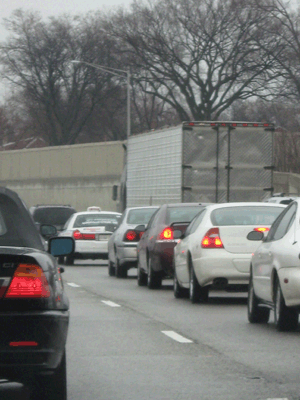Metropolitan Chicago’s intersection of rail, road, air, and water networks make it an integral part of the global marketplace. However, increasing congestion threatens the long-term health of Chicagolands’s economy. Not only does congestion impose additional costs upon business, but it also stymies larger firms’ ability to develop cost-saving logistic strategies. Moreover, congestion imposes a penalty upon the region of an estimated 87,000 jobs — the number of jobs predicted for a less gridlocked environment. Mitigating the Chicago region’s congestion woes will create jobs and attract new investment, as well as eliminate the current costs that businesses and their customers must pay.

Congested traffic slows freight movement
The cost of congestion in wasted time for trucks is an estimated $1 billion, which accounts for about 14 percent of the $7.3 billion cost of congestion on the region’s roads. The cost of congestion delays to trucks in wasted fuel could not be readily estimated, however, so the cost to the region’s freight businesses easily surpasses $1 billion a year.
Of the total daily truck trips in the Chicago metropolitan region, 7.7 percent have an origin or destination in Chicago’s Central Business District. However, these trips accounted for only 3.2 percent of regional truck vehicle miles traveled (VMT) during peak traffic periods, because they tend to be relatively short, averaging 6.2 miles per trip versus 15.6 miles for other trips. Because time delays on both arterials and expressways tend to be significant in central Chicago, however, such trips bear about 5 percent of the congestion costs incurred on truck trips in the region. In 2005, the cost of truck delay due to congestion in the Central Business District equaled about $47 million per year.
This estimate reflects only the costs that congestion imposes in reduced speeds during travel. Another type of congestion cost arises from the competition of delivery trucks for limited loading zone and dock space in the downtown core. A Chicago Dept. of Transportation study found the scarcity of such space to be a significant part of the “last mile challenge” for trucks making pickups and deliveries downtown.
Congestion also slows the adoption of cost-saving logistic strategies that depend on transportation being fast and reliable. This adds another $160 million to the cost of congestion to the region. Less congestion would result in shorter and more reliable travel times, enabling distributors to reduce buffer time and the need to maintain precautionary inventory in the event of late or missed deliveries. Carriers would be able to avoid expenses from driver changes or rest breaks needed to comply with hours of service regulations, and manufacturers could offer their employees more attractive hours, as schedules would not be bound to the sharp delivery and pick-up deadlines necessitated by congestion and the uncertainty it brings.
Congested traffic conditions threaten business
Wasted time and fuel affect the truck freight industry, as well as other firms that rely on their employees’ ability to move around the region. The service sector, with employees traveling to meetings, making repair calls and deliveries, is particularly burdened by congestion. A previous study by the National Cooperative Highway Research Program found a 22 percent reduction in the Chicago region’s congestion would generate a 5.5 percent reduction in the cost of overall business travel on the region’s roads. The effect of that reduction is more than twice as great for the service sector as it is for other non-freight business such as manufacturing or agriculture.
Congested traffic conditions reduce job growth
The burden of congestion on commuters creates problems for area employers and stymies job creation. Employers may have to pay higher recruitment costs and offer higher pay to attract workers to job locations not served by transit. At the regional level, high commuting costs effectively increase the cost of living in a region, and some of that higher cost gets passed on to employers. In turn, labor costs can undermine a region’s economic competitiveness, ultimately resulting in a reduction in employment. Excess commuting time costs Chicagoland 87,000 jobs.
Understanding the numbers
Using earlier TTI and CMAP figures, heavy truck vehicle-hours of delay in 2005 were estimated at about 60,000 hours per day; at the estimated cost per truck-hour of delay for driver time and cargo ($66.83 per hour), this equates to a total daily cost of truck delay of $4 million. Annualizing at 250 work days per year, the estimated total cost of congestion delays to trucks on Chicago region roads is $1 billion .
To estimate the reduction in employment in the Chicago region that results from the burden of congestion on car-commuters, HDR assumed that half of the additional commuting costs caused by congestion gets passed on to employers, and the elasticity of labor demand at the metropolitan area level, which measures the sensitivity of labor demand to changes in labor cost, was 1.35. These two factors, when combined with regional labor and congestion statistics, enabled HDR to determine congestion costs the region approximately 87,000 jobs.
Policy Implications
The Chicago region’s position in the global economy is compromised by congestion. Wasted time alone costs the freight industry $1 billion a year. To cement its status as a global center of commerce, the region needs policies that will reduce overall costs to business by reducing the impact of congestion.
Strategies to reduce regional congestion must:
-Reduce delay and increase the reliability of travel times, but not detract from
quality of life.
-Make the Chicago region more attractive to global investors.
-Be measurable and sustainable.
Cost-saving logistics practices are often contingent on dependable travel times, and bottom-line-sensitive firms would willingly pay for reduced congestion if it meant savings in the long-run. Firms need to move their goods through Chicago, but also locate their offices and their employees in this region. Strategies that improve quality of life in the region and notable improvements and expansion of the transit network will give us a major competitive advantage over other global players.
Return to the main page of Moving at the Speed of Congestion.